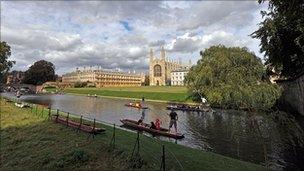Cambridge knocks Harvard off top of university table
- Published

Cambridge cements its reputation as a world-class university, according to the survey
Cambridge University has come top of an international university rankings table, knocking Harvard off top spot.
The US university, which had topped the rankings by careers advice company QS since 2004, slips to second place.
The QS rankings assess university research quality, graduate employability, teaching commitment and international commitment.
The UK's University College London, Oxford and Imperial College are also in the top 10.
King's College London and Edinburgh University also appear in the top 25 institutions.
In total, 22 countries are represented in the Top 100 - up from 19 last year. Of those, 15 are Asian universities, led by the University of Hong Kong at 23.
The QS rankings are weighted 40% to academic reputation, 10% to employability, 20% to citations, 20% to the staff-student ratio and give a further 10% weighting to how international the make-up of the faculty and student body is.
In previous years, the QS rankings have been published in partnership with the UK's Times Higher Education (THE) magazine.
But THE is not working with QS this year because it is concerned that the careers advice company's rankings rely too heavily on subjective surveys of scholars and employers, and not enough on hard indicators of excellence.
THE is publishing its own rankings next week, which are expected to contain disappointing news for some prestigious British institutions.
Students' interests
Ben Sowter, head of research at QS said: "Unlike other rankings systems which rely heavily on statistical indicators of university research, QS also takes into account the most up-to-date views of employers and academics, reflecting the broader interests of students and parents.
"QS rankings reflect the highly competitive environment of global higher education.
"Given the uncertain economic outlook, it is reassuring for students that the top 200 universities are also, by and large, the most popular universities with employers, suggesting that a world-class degree remains the best path to a great job."
The rankings come after a report by the Organisation for Economic Co-operation and Development (OECD), released on Tuesday, showed the UK was slipping behind its international rivals in the number of graduates produced.
Between 2000 and 2008, it fell from third highest to fifteenth among top industrialised nations when the proportion of young people graduating was measured.
The UK now trails higher education systems in Poland, Iceland, Portugal and Slovakia, the OECD report found.
- Published7 September 2010